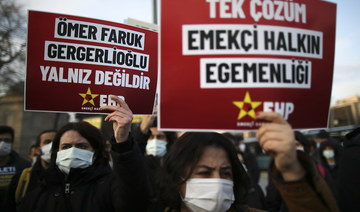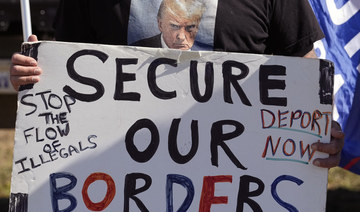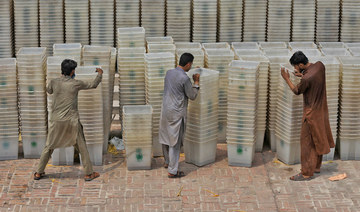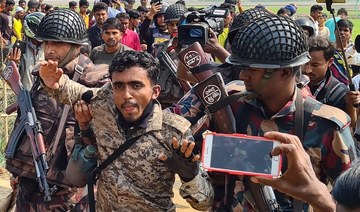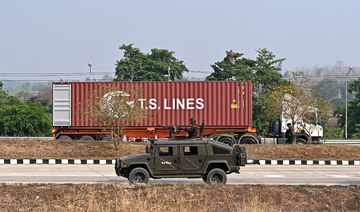PARIS: French police cordoned off the Iranian consulate in Paris on Friday and were preparing to enter it at the consulate’s request, after a report that someone had come in with an explosive, a police source said.
“A witness saw a man enter carrying a grenade or an explosive belt,” the source said, adding that an elite police unit had been mobilized after the consulate requested an intervention.
French police cordon off Iran consulate in Paris: security source
https://arab.news/9hj8u
French police cordon off Iran consulate in Paris: security source
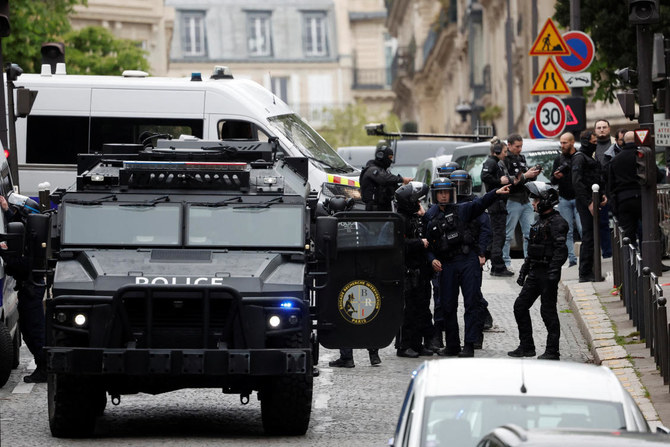
- Police preparing to enter property at the consulate’s request
Kurds deny torturing detainees in north Syria camps
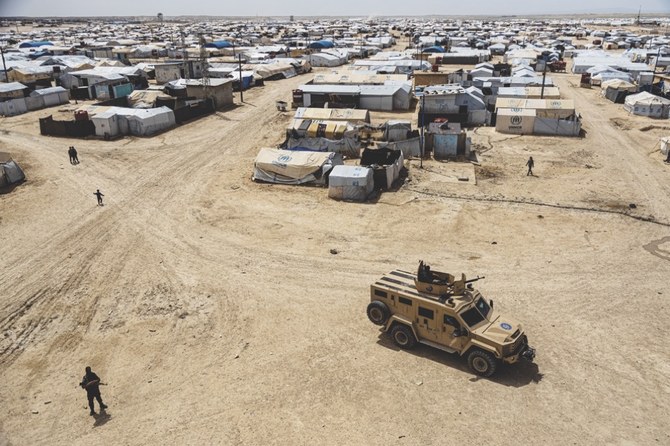
- Rights group alleges cruelty against Daesh militant prisoners and their families
JEDDAH: Kurdish authorities in northeast Syria on Thursday denied claims by Amnesty International that they tortured Daesh militants and their dependents detained in internment camps.
More than 56,000 prisoners with links to the Islamist militant group are still being held five years after Daesh were driven out of their last territory in Syria. They include militants locked up in prisons, and Daesh fighters’ wives and children in Al-Hol and Roj camps.
Amnesty secretary general Agnes Callamard said Kurdish authorities had “committed the war crimes of torture and cruel treatment, and probably committed the war crime of murder.”
The semi-autonomous Kurdish administration in northeast Syria said it “respects its obligations to prevent the violation of its laws, which prohibit such illegal acts, and adheres to international law.”
Any such crimes that may have been perpetrated were “individual acts,” it said, and asked Amnesty to provide it with any evidence of wrongdoing by its security forces and affiliates.
“We are open to cooperating with Amnesty International regarding its proposed recommendations, which require concerted regional and international efforts,” it said.
Kurdish authorities said they had repeatedly asked the international community for help in managing the camps, which required “huge financial resources.”
Al-Hol is the largest internment camp in northeast Syria, with more than 43,000 detainees from 47 countries, most of them women and children related to Daesh fighters.
Who’s Who: Ali Alhasan, CEO and founder of NanoPalm

- Alhasan co-developed deep tech to leverage large language models for biotech discovery
- He was granted the Outstanding Researcher Award from the International Institute for Nanotechnology in 2012
Ali Alhasan is CEO and founder of the company NanoPalm. He holds a Ph.D. in nanomedicine, with expertise in nano-drug delivery and gene therapy and five years of experience in executive management.
In his role as CEO, Alhasan formulates the strategic and business plans for accelerating therapy translation globally and trains talents in deep tech, nanotech, and gene editing tech.
Alhasan co-developed deep tech to leverage large language models for biotech discovery. He also co-invented Nanopalm’s biorobots for the delivery of gene editing primers and helped discover four nanomedicines for four different genetic diseases.
He is also an associate professor at King Abdulaziz City for Science and Technology and an adjunct professor at Alfaisal University, establishing collaboration agreements between the two.
As associate professor, he is the principal researcher for development and innovation in nanomedicine and the fourth industrial revolution.
In his role as adjunct professor, Alhasan teaches nanomedicine and mentors postgraduate and undergraduate students. He also co-established the Cancer Nanoscience Program.
Previously, Alhasan served in executive leadership roles at KACST as deputy at the Joint Centers of Excellence Program (2021), deputy of the Life Science and Environment Research Institute (2020), director of the Center of Excellence for Biomedicine (2020), and director of Strategic Initiatives (2016).
Alhasan was a post-doctoral scholar at the University of California in 2015 and received his Ph.D. in the Interdepartmental Biological Sciences Program from Northwestern University in 2013.
In 2008, he received a master’s degree in biotechnology also from Northwestern University, while in 2001, he received his bachelor’s degree in medical technology from King Abdulaziz University.
Alhasan was granted the Leader of the Year award from the Ministry of Communication and Information Technology in 2024. In 2018, he received the Outstanding Investigator Award from KACST.
He was granted the Outstanding Researcher Award from the International Institute for Nanotechnology in 2012.
Russian state media is posting more on TikTok ahead of the US presidential election, study says

- State-linked accounts are also active on other social media platforms and have a larger presence on Telegram and X than on TikTok, says Brookings Institution report
- The report comes after Biden last month signed legislation forcing TikTok’s parent company — China-based ByteDance — to sell the platform or face a ban in the US
Russian state-affiliated accounts have boosted their use of TikTok and are getting more engagement on the short-form video platform ahead of the US presidential election, according to a study published Thursday by the nonprofit Brookings Institution.
The report states that Russia is increasingly leveraging TikTok to disseminate Kremlin messages in both English and Spanish, with state-linked accounts posting far more frequently on the platform than they did two years ago.
Such accounts are also active on other social media platforms and have a larger presence on Telegram and X than on TikTok. However, the report says user engagement — such as likes, views and shares — on their posts has been much higher on TikTok than on either Telegram or X.
“The use of TikTok highlights a growing, but still not fully realized, avenue for Russia’s state-backed information apparatus to reach new, young audiences,” reads the report, which drew data from 70 different state-affiliated accounts and was authored by Valerie Wirtschafter, a Brookings fellow in foreign policy and its artificial intelligence initiative.
The study notes that most posts do not focus on US politics but other issues, like the war in Ukraine and NATO. However, those that do tend to feature more divisive topics like US policy on Israel and Russia, and questions around President Joe Biden’s age, the Brookings report says.
A TikTok spokesperson said the company has removed covert influence operations in the past and eliminated accounts, including 13 networks operating from Russia.
The spokesperson said TikTok also labels state-controlled media accounts and will expand that policy in the coming weeks “to further address accounts that attempt to reach communities outside their home country on current global events and affairs.”
The Brookings report comes after Biden last month signed legislation forcing TikTok’s parent company — China-based ByteDance — to sell the platform or face a ban in the US. The potential ban is expected to face legal challenges.
Hamas is sending a delegation to Egypt for further ceasefire talks in the latest sign of progress

- US and Egyptian mediators have put to Hamas a proposal -– apparently with Israel’s acceptance — that sets out a three-stage process that would bring an immediate six-week ceasefire and partial release of Israeli hostages
BEIRUT: Hamas said Thursday that it was sending a delegation to Egypt for further ceasefire talks, in a new sign of progress in attempts by international mediators to hammer out an agreement between Israel and the militant group to end the war in Gaza.
After months of stop-and-start negotiations, the ceasefire efforts appear to have reached a critical stage, with Egyptian and American mediators reporting signs of compromise in recent days. But chances for the deal remain entangled with the key question of whether Israel will accept an end to the war without reaching its stated goal of destroying Hamas.
The stakes in the ceasefire negotiations were made clear in a new UN report that said if the Israel-Hamas war stops today, it will still take until 2040 to rebuild all the homes that have been destroyed by nearly seven months of Israeli bombardment and ground offensives in Gaza. It warned that the impact of the damage to the economy will set back development for generations and will only get worse with every month fighting continues.
The proposal that US and Egyptian mediators have put to Hamas -– apparently with Israel’s acceptance — sets out a three-stage process that would bring an immediate six-week ceasefire and partial release of Israeli hostages, but also negotiations over a “permanent calm” that includes some sort of Israeli withdrawal from Gaza, according to an Egyptian official. Hamas is seeking guarantees for a full Israeli withdrawal and complete end to the war.
Hamas officials have sent mixed signals about the proposal in recent days. But on Thursday, its supreme leader, Ismail Haniyeh, said in a statement that he had spoken to Egypt’s intelligence chief and “stressed the positive spirit of the movement in studying the ceasefire proposal.”
The statement said that Hamas negotiators would travel to Cairo “to complete the ongoing discussions with the aim of working forward for an agreement.” Haniyeh said he had also spoken to the prime minister of Qatar, another key mediator in the process.
The brokers are hopeful that the deal will bring an end to a conflict that has killed more than 34,000 Palestinians, according to local health officials, caused widespread destruction and plunged the territory into a humanitarian crisis. They also hope a deal will avert an Israeli attack on Rafah, where more than half of Gaza’s 2.3 million people have sought shelter after fleeing battle zones elsewhere in the territory.
If Israel does agree to end the war in return for a full hostage release, it would be a major turnaround. Since Hamas’ Oct. 7 attack stunned Israel, its leaders have vowed not to stop their bombardment and ground offensives until the militant group is destroyed. They also say Israel must keep a military presence in Gaza and security control after the war to ensure Hamas doesn’t rebuild.
Publicly at least, Israeli Prime Minister Benjamin Netanyahu continues to insist that is the only acceptable endgame.
He has vowed that even if a ceasefire is reached, Israel will eventually attack Rafah, which he says is Hamas’ last stronghold in Gaza. He repeated his determination to do so in talks Wednesday with US Secretary of State Antony Blinken, who was in Israel on a regional tour to push the deal through.
The agreement’s immediate fate hinges on whether Hamas will accept uncertainty over the final phases to bring the initial six-week pause in fighting — and at least postpone what it is feared would be a devastating assault on Rafah.
Egypt has been privately assuring Hamas that the deal will mean a total end to the war. But the Egyptian official said Hamas says the text’s language is too vague and wants it to specify a complete Israeli pullout from all of Gaza. The official spoke on condition of anonymity to talk about the internal deliberations.
On Wednesday evening, however, the news looked less positive as Osama Hamdan, a top Hamas official, expressed skepticism, saying the group’s initial position was “negative.” Speaking to Hezbollah’s Al-Manar TV, he said that talks were still ongoing but would stop if Israel invades Rafah.
Blinken hiked up pressure on Hamas to accept, saying Israel had made “very important” compromises.
“There’s no time for further haggling. The deal is there,” Blinken said Wednesday before leaving for the US
An Israeli airstrike, meanwhile, killed at least five people, including a child, in Deir Al-Balah in central Gaza. The bodies were seen and counted by Associated Press journalists at a hospital.
The war broke out on Oct. 7. when Hamas militants broke into southern Israel and killed over 1,200 people, mostly Israelis, taking around 250 others hostage, some released during a ceasefire on November.
The Israel-Hamas war was sparked by the Oct. 7 raid into southern Israel in which militants killed around 1,200 people, mostly civilians, and abducted around 250 hostages. Hamas is believed to still hold around 100 hostages and the remains of more than 30 others.
Since then, Israel’s campaign in Gaza has wreaked vast destruction and brought a humanitarian disaster, with several hundred thousand Palestinians in northern Gaza facing imminent famine, according to the UN More than 80 percent of the population has been driven from their homes.
The “productive basis of the economy has been destroyed” and poverty is rising sharply among Palestinians, according to the report released Thursday by the United Nations Development Program and the Economic and Social Commission for Western Asia.
It said that in 2024, the entire Palestinian economy — including both Gaza and the West Bank -– has so far contracted 25.8 percent. If the war continues, the loss will reach a “staggering” 29 percent by July, it said. The West Bank economy has been hit by Israel’s decision to cancel the work permits for tens of thousands of laborers who depended on jobs inside Israel.
“These new figures warn that the suffering in Gaza will not end when the war does,” UNDP administrator Achim Steiner said. He warned of a “serious development crisis that jeopardizes the future of generations to come.”
India deports Myanmar refugees who fled 2021 coup

- At least 38 refugees were deported on Thursday by the border state of Manipur
- ndia is not a signatory to the1951 UN Refugee Convention and has no law protecting refugees
GUWAHATI, India: India on Thursday deported the first group of Myanmar refugees who had sought shelter after a 2021 military coup, a top state minister said, following weeks of efforts that were hampered by fighting between Myanmar’s rebel forces and the ruling junta.
Thousands of civilians and hundreds of troops from Myanmar have crossed the border to India after the coup. This has worried New Delhi, which has announced plans to fence its border with Myanmar and end a visa-free movement policy.
At least 38 refugees were deported on Thursday by the border state of Manipur, which plans send back a total of 77 people as it copes with sporadic violence that has killed at least 220 people since ethnic clashes broke out in May last year.
“Without any discrimination, we have completed the first phase of deportation of illegal immigrants from Myanmar,” Manipur Chief Minister N. Biren Singh said in a social media post. “The state government is continuing the identification of illegal immigrants.”
One Indian national was also repatriated by Myanmar, Singh added.
New Delhi has not signed the 1951 UN Refugee Convention, which spells out refugee rights and states’ responsibilities to protect them, and it does not have its own laws protecting refugees.
Singh, who is from Prime Minister Narendra Modi’s Bharatiya Janata Party, said in March deportations had begun, but Indian security officials said the efforts were held up by fighting in Myanmar.
Modi is seeking a rare third straight term in ongoing national elections and his government has blamed the refugee influx as one reason for violence that has roiled Manipur.





